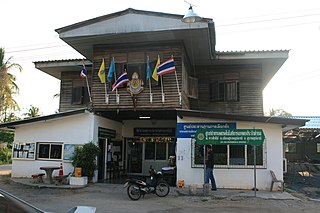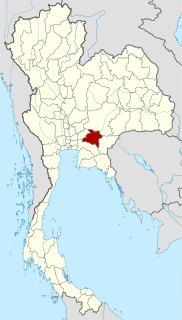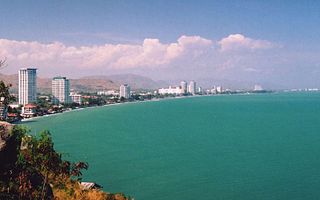This article does not cite any sources .(February 2018) (Learn how and when to remove this template message) |
| Wat Khao Wong | |
|---|---|
| Basic information | |
| Location | Wang Hin |
| Geographic coordinates | 15°18′11″N99°45′15″E / 15.30306°N 99.75417°E Coordinates: 15°18′11″N99°45′15″E / 15.30306°N 99.75417°E |
| Deity | Buddha |
| District | Ban Rai |
| Province | Uthai Thani |
| Country | Thailand |
Wat Khao Wong or Wat Kao Wong or Wat Khao Wong Phrohm-majan (วัดเขาวงพรหมจรรย์) is a Buddhist temple in tambon Wang Hin, southeastern Uthai Thani Province, Thailand, near the border with Chai Nat Province. It lies in a valley off Highway 3213 and is located southeast of the town of Khao Bang Kraek.

Buddhism is the world's fourth-largest religion with over 520 million followers, or over 7% of the global population, known as Buddhists. Buddhism encompasses a variety of traditions, beliefs and spiritual practices largely based on original teachings attributed to the Buddha and resulting interpreted philosophies. Buddhism originated in ancient India as a Sramana tradition sometime between the 6th and 4th centuries BCE, spreading through much of Asia. Two major extant branches of Buddhism are generally recognized by scholars: Theravada and Mahayana.

Tambon is a local governmental unit in Thailand. Below district (amphoe) and province (changwat), they form the third administrative subdivision level. As of 2016 there were 7,255 tambons, not including the 180 khwaeng of Bangkok, which are set at the same administrative level, thus every district contains eight to ten tambon. Tambon is usually translated as "township" or "subdistrict" in English — the latter is the recommended translation, though also often used for king amphoe, the designation for a subdistrict acting as a branch of the parent district. Tambon are further subdivided into 69,307 villages (muban), about ten per tambon. Tambon within cities or towns are not subdivided into villages, but may have less formal communities called chumchon (ชุมชน) that may be formed into community associations.

Uthai Thani is one of the provinces (changwat) of Thailand. Neighboring provinces are Nakhon Sawan, Chai Nat, Suphan Buri, Kanchanaburi, and Tak. It is in Thailand's lower northern region, somewhat off the route between Bangkok and Chiang Mai. It is approximately 200 km from Bangkok.
| Wikimedia Commons has media related to Wat Kao Wong . |
| This article about a Thai building or structure is a stub. You can help Wikipedia by expanding it. |


















